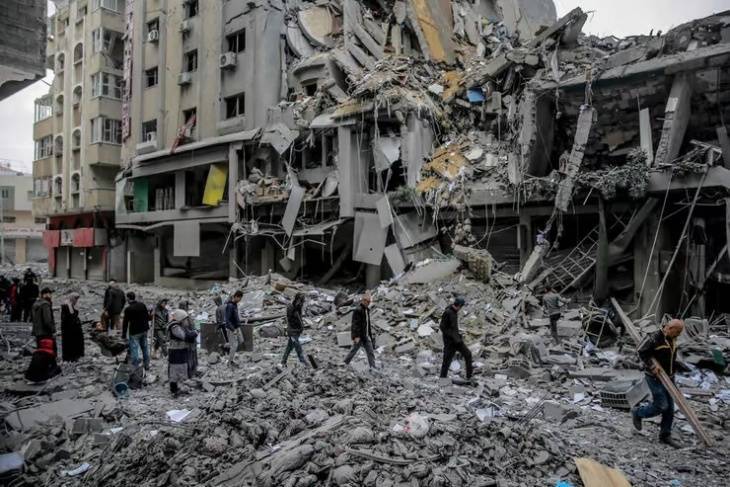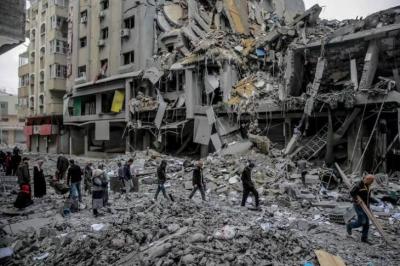Axios reported that U.S. National Security Council adviser John Kirby stated that delegations have returned to Cairo to discuss a new proposal. He clarified that the Israeli side has presented an offer to Hamas in Cairo, and "we are waiting for a response from its leader Yehya Sinwar, which may take a few days." Mediators presented a new proposal in the last round of negotiations in Cairo for a ceasefire in three phases.
The proposal includes the return of unarmed civilian displaced persons to northern Gaza without specifying their numbers, as well as Israel's acceptance to open the al-Rashid and Salah al-Din streets and station its forces 500 meters away from them. Additionally, it involves bringing in 500 trucks of aid daily to the Gaza Strip, including the north. The proposal also includes the release of 900 Palestinian prisoners by Israel, among them 100 serving life sentences in the first phase.
"In the second phase, it includes the release of all Israeli prisoners and concluding negotiations for a sustainable calm." The proposal did not specify the number of Palestinian prisoners to be released in the second phase or the withdrawal of Israel. A senior Hamas official stated to Al-Sharq that the Israeli delegation participating in the Cairo talks regarding the ceasefire in Gaza, which took place on Sunday, "did not respond to any of our demands," indicating that his movement's delegation left the Egyptian capital on Monday morning for Doha to consult with the movement's leadership regarding "American proposals."
Informed sources revealed that CIA Director William Burns proposed to the delegations to stop all forms of fighting in Gaza during the Eid al-Fitr holiday, during which proposals for "compromise" regarding the return of displaced persons from southern Gaza to the north will be discussed, including the number of prisoners to be released by both sides and the areas of Israeli withdrawal during the expected 42-day truce.
The return of the displaced persons to northern Gaza is a crucial point in the ongoing negotiations concerning the implementation of the first phase of the "Paris path." While Hamas insists on the return of all displaced individuals to their homes and the areas from which they were displaced, Israel insists that only the elderly and youth return to new camps that are being established in specific areas in the north.
Hamas officials told Al-Sharq that the movement is committed to the return of the displaced to thwart an Israeli plan aimed at a permanent occupation of areas in northern Gaza and creating new refugee camps. One of the movement's officials added: "Our insistence on the return of the displaced is born out of rejection of displacing our people, even if this displacement is within the Strip."
Israel had suggested in recent meetings the return of 2,000 displaced persons daily, consisting of the elderly and youth, starting from the third week of the ceasefire, with the intention of returning them to "new camps established from tents under international supervision."
The new round of negotiations between Hamas and Israel witnessed "positive atmospheres" and achieved "notable progress" in narrowing the viewpoints regarding reaching a truce in Gaza. The mediators (Egypt, Qatar, and the United States) exerted intense pressure to accept a new draft agreement including a ceasefire in Gaza, along with a prisoner and detainee exchange deal between both sides before Eid al-Fitr, expected next Wednesday.
A source from Egypt told Al-Sharq that the negotiations in Cairo experienced "positive atmospheres," expecting "greater flexibility from the conflicting parties, especially after expanding the Israeli delegation's mandate." The source pointed out that "the mediators have a desire approaching insistence on concluding a ceasefire agreement."
An Arab source informed the Arab World News Agency (AWP) that the United States asked Egypt and Qatar to pressure Hamas, while Washington is pressing Israel to reach an agreement for a prisoner exchange and a truce lasting six weeks. The U.S. proposal in the negotiations includes the numbers and methods for the return of the displaced persons from the south to northern Gaza, as well as the number of prisoners to be released by both sides, and it includes a proposal regarding the hours of halting reconnaissance flights and stopping fighting, and starting negotiations concerning the second and third phases of the truce while the first phase is being implemented.
Regarding aid, tents, and mobile homes, the U.S. did not propose changes as there was a consensus in previous negotiations regarding them, with Washington's intervention confined to the method of distributing assistance and delivering it to those entitled to it and overseeing authorities.
The source noted that the Israeli withdrawal from city centers will continue during the truce, indicating that details of the U.S. proposal are expected to be announced within hours. Hamas is waiting for a response from its leadership in Gaza, while the Israeli side is expected to respond to the U.S. proposal within 48 hours, according to the source.
The negotiation round in Cairo featured the participation of CIA Director William Burns, Egyptian General Intelligence Chief Abbas Kamel, Qatari Prime Minister and Foreign Minister Sheikh Mohammed bin Abdul Rahman, an Israeli delegation led by Mossad Director David Barnea, and a delegation from Hamas led by Khalil al-Hayya.




